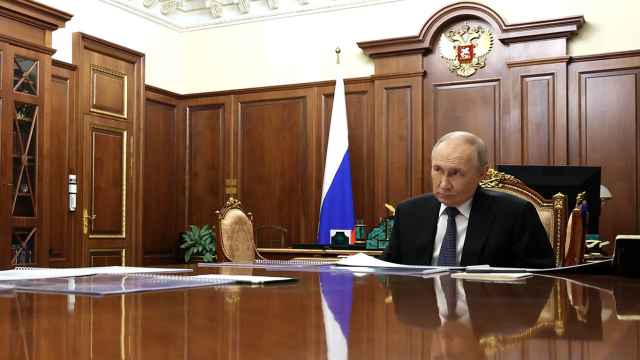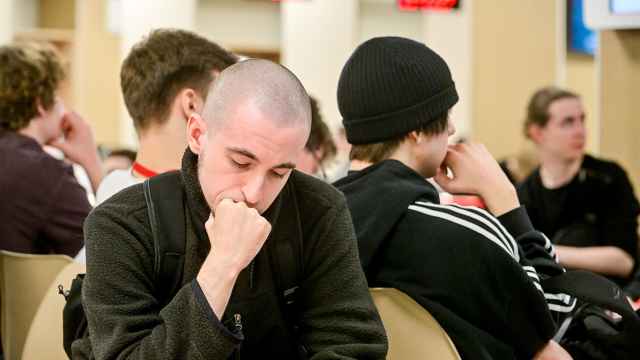VIENNA ― GONGOs, or government-organized non-governmental organizations, are increasingly being used by the powers that be in Russia to elbow aside genuine NGOs just as the government did in the late Soviet period. That is contributing to a situation in which "history and farce" coexist, according to a leading Moscow human rights activist.
In a recent essay in Yezhednevny Zhurnal, or Daily Journal, Alexander Podrabinek says that in Russia today, there exist at one and the same time genuine NGOs and "parodies" of them, the GONGOs. "The latter, of course, do not call themselves that," but seek to be equated with the former and often are taken as such by others.
Paul Goble is a longtime specialist on ethnic and religious questions in Eurasia. Most recently, he was director of research and publications at the Azerbaijan Diplomatic Academy. Earlier, he served as vice dean for the social sciences and humanities at Audentes University in Tallinn and as a senior research associate at the EuroCollege of the University of Tartu in Estonia.
Prior he served in the U.S. State Department, the Central Intelligence Agency and the International Broadcasting Bureau, as well as at Voice of America and Radio Free Europe/Radio Liberty and at the Carnegie Endowment for International Peace. Mr. Goble can be contacted directly at paul.goble@gmail.com
"Such counterfeit organizations began to appear in Soviet times, but recently they have become more numerous and active," Podrabinek suggests. The "classical example" of a Soviet-era GONGO was the International Commission on Human Rights set up by Moscow in 1987 and headed by Fedor Burlatsky, a communist functionary.
That organization sought to redirect to itself "all foreign contacts" interested in human rights in the Soviet Union and thus push aside "the remains of the dissident movement and the new independent human rights groups." Despite some successes in individual cases, the rights activist says, "it didn't succeed" very often.
"Today," Podrabinek continues, "Russia's GONGOs are more numerous and varied," although "the designation of 'public' organizations as 'government' ones is conditional" because "in their founding documents, they do not declare their ties with the state." Nonetheless, it is possible to identify them.
There are two basic indicators. First, "on essential questions, they support the powers that be," and second, "they receive financing for their activities from domestic government structures." (That distinguishes them from a third kind of NGO, the DONGO, or donor-organized NGO. Podrabinek does not discuss their status in his essay.)
An example that he gives of an NGO that meets these GONGO standards is a movement called "Resistance," which receives government financing for its activities and which was tasked with distributing 170 million rubles ($5.7 million) in grants to other bodies during 2009.
This movement is headed by Olga Kostina, the wife of the deputy head of the presidential administration's domestic policy department. Her "human rights defense credo" is reflected in her declaration that "over the course of decades, Russian human rights defense has been formed and conceived exclusively as a political force opposed to the powers that be … Today, the social demand both in Russia and in world practice focuses on the side of the resolution of social tasks." That is a definition that the Kremlin could certainly be happy with, but one that has little connection to the world of genuine human rights NGOs.
Kostina's Resistance is hardly alone. In 2009, Podrabinek writes, four other similarly "little known organizations" were given budgetary funds amounting to 1.2 billion rubles ($40 million) for further distribution, an astronomical sum compared to the shoestring budgets of most genuine NGOs in Russia.
"Pillaging the budget," of course, "is an everyday activity in present-day Russia," he adds, and consequently it is more interesting to track the ways in which these groups and their spokespeople appear in the public space. They often create the impression that the human rights community is on whatever side the powers that be want it to be on.
All too often, he continues, genuine human rights activists are tempted to get involved with GONGOs. But "unfortunately, it has evolved so that the movement between NGOs and GONGOs is a one-way street." NGOs "drift toward the government ones and never the other way around," he says.
One example is the willingness of some human rights activists to join "the social councils of those very state structures that are the sources of human rights violations, such as the security ministries, the Presidential Administration and the government."
But most genuine activists "do not permit themselves" that luxury. Among those who do join, only a few, such as Oleg Orlov, or most recently, Ella Pamfilova, choose to leave. The others who have joined such institutions "prefer to risk their reputations for the special status such memberships provide."
Those who try to combine human rights activities and GONGO membership are a manifestation of the conditions of the time, Podrabinek writes. They are "public and independent," but they exist "on the basis of support from the state in the interests of the powers that be."
"Today, the clearest examples of such organizations are the youth movements created by state patronage. They act in the interests of the powers that be in playing with public enthusiasm," especially among the young, Podrabinek asserts.
These youth groups exemplify yet another characteristic of GONGOs: "Life in such GONGOs is rich but not long-lived." Those standing behind them are constantly renaming and reorganizing them, not only to confuse society, but also to allow for more theft from budgets. Moreover, Podrabinek says, GONGOs and their members "do not have any special need to be concerned about their own reputations."
It is quite another matter for actual human rights activists, he concludes. The basis of their successful operation rests on their good names, and "cooperation with the institutions of the powers that be will not strengthen the reputations" of those human rights activists who may otherwise be tempted to cooperate.
A Message from The Moscow Times:
Dear readers,
We are facing unprecedented challenges. Russia's Prosecutor General's Office has designated The Moscow Times as an "undesirable" organization, criminalizing our work and putting our staff at risk of prosecution. This follows our earlier unjust labeling as a "foreign agent."
These actions are direct attempts to silence independent journalism in Russia. The authorities claim our work "discredits the decisions of the Russian leadership." We see things differently: we strive to provide accurate, unbiased reporting on Russia.
We, the journalists of The Moscow Times, refuse to be silenced. But to continue our work, we need your help.
Your support, no matter how small, makes a world of difference. If you can, please support us monthly starting from just $2. It's quick to set up, and every contribution makes a significant impact.
By supporting The Moscow Times, you're defending open, independent journalism in the face of repression. Thank you for standing with us.
Remind me later.






